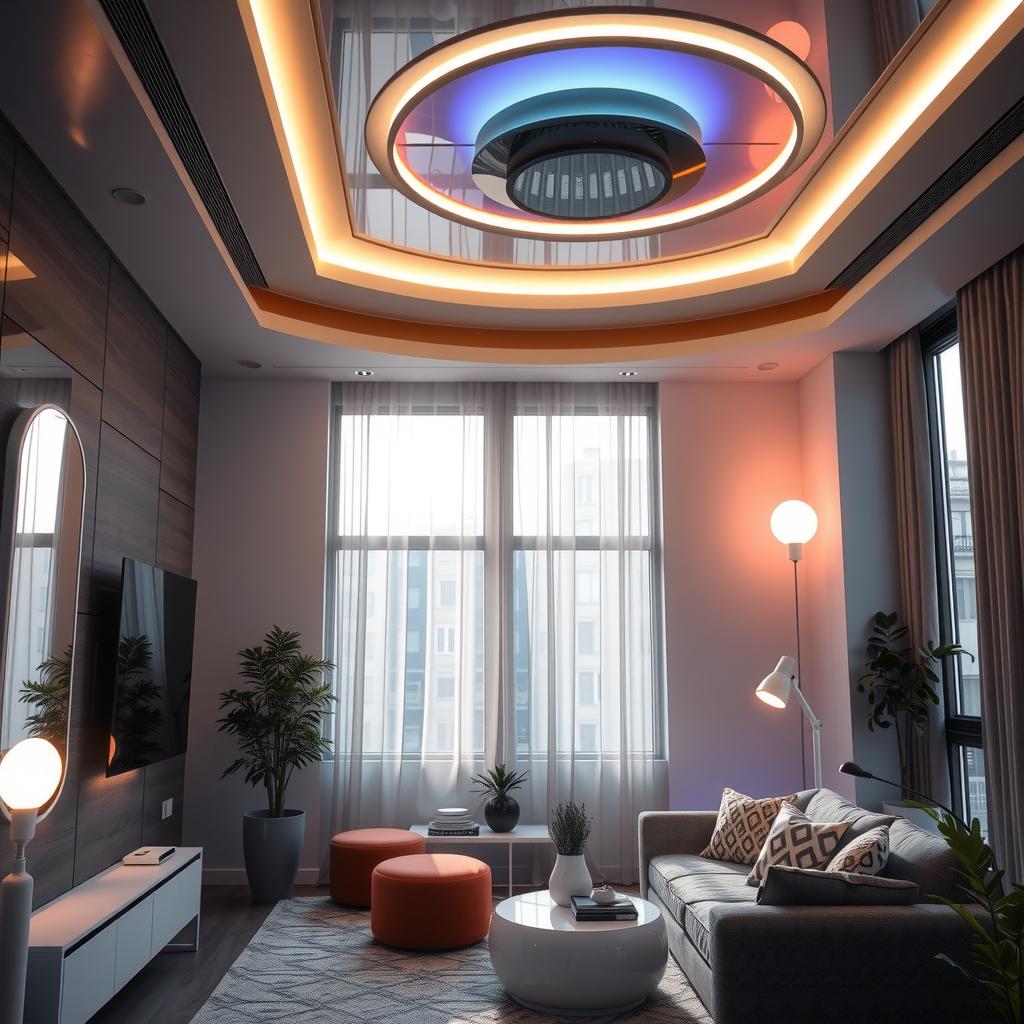In an era where technology permeates every aspect of daily life, the concept of a smart home has transitioned from a futuristic dream to an everyday reality. With the rise in popularity of home automation, many individuals find themselves grappling with a common dilemma: how can they optimize their living space for enhanced convenience, energy efficiency, and security? The answer lies in machine learning, a groundbreaking facet of automation technology that empowers intelligent systems to learn from user interactions and adapt accordingly. As homes become increasingly interconnected through various devices—from thermostats to security cameras—understanding the capabilities of these technologies becomes essential.
The core value of integrating machine learning into smart home ecosystems is its ability to create personalized experiences that not only simplify mundane tasks but also enhance overall quality of life. By harnessing data analysis techniques, these intelligent systems can predict user preferences and behaviors, allowing for seamless remote control over household functions. This leads to significant improvements in energy efficiency—an important consideration for eco-conscious homeowners looking to reduce their carbon footprint while saving on utility bills.
Moreover, the incorporation of advanced security solutions powered by machine learning enables homeowners to monitor their properties more effectively than ever before. Automated alerts based on unusual patterns or unauthorized access provide peace of mind and bolster safety measures without requiring constant vigilance from residents. As consumers become more aware of these innovations, they will naturally begin seeking ways to implement them within their own homes.
This blog post delves deeper into the fascinating realm where machine learning intersects with smart home automation. It explores various applications ranging from predictive maintenance and smart lighting systems to advanced climate control mechanisms—all designed with one goal: enhancing user experience while maximizing efficiency. Readers are invited on this journey as we unravel how intelligent systems are revolutionizing modern living spaces, making them safer and smarter than ever before.

Key Points:
-
Tailored User Experience: Personalized automation through data analysis
The integration of machine learning within smart home systems revolutionizes the way users interact with their living spaces. By analyzing data from various household devices, intelligent systems adapt to individual preferences over time. This capability allows for a customized user experience where lighting and temperature control can automatically adjust according to established habits and environmental conditions, thus enhancing comfort while maximizing energy efficiency. -
Remote Control Capabilities: Management from anywhere enhances convenience
As technology evolves, homeowners are increasingly enabled to manage their environments remotely. The ability to control heating systems, security cameras, and other appliances via intuitive applications not only fosters peace of mind but also significantly improves safety measures across properties. These advancements in automation technology ensure that users have comprehensive oversight of their homes at all times. -
Proactive Security Solutions: Intelligent responses for enhanced safety
The future of smart homes lies in sophisticated features such as predictive maintenance alerts and proactive responses during unusual activities. With the aid of advanced data analysis techniques inherent in intelligent systems powered by machine learning, these solutions transform ordinary gadgets into responsive companions that actively monitor the environment for potential threats or issues. This heightened level of security is a testament to how home automation can profoundly influence modern lifestyles while promoting an overall sense of safety and well-being.

The Evolution of Living Spaces
Transforming Homes into Intelligent Ecosystems
The advent of machine learning has revolutionized the concept of home living, paving the way for what is now commonly referred to as a smart home. By leveraging advanced automation technology, traditional homes are being transformed into intelligent ecosystems that enhance both convenience and efficiency. These systems utilize data analysis to learn user preferences and behaviors, enabling them to automate routine tasks seamlessly. For instance, smart thermostats can adapt heating and cooling settings based on historical usage patterns, thereby optimizing energy consumption while ensuring comfort. Such innovations not only contribute significantly to energy efficiency but also reduce overall utility costs for homeowners. As these intelligent systems continue to evolve, their ability to integrate with various devices—from lighting systems that adjust according to natural light levels to security solutions that monitor unusual activity around the property—illustrates a significant leap in how individuals interact with their environments.
Enhancing User Experience
The Role of Personalization in Smart Homes
At the heart of any successful smart home lies an enhanced user experience driven by personalization capabilities rooted in machine learning algorithms. These sophisticated algorithms analyze vast amounts of data collected from various sensors within the home environment—data pertaining not just to energy use but also resident habits and preferences. This enables automation technologies like smart speakers or voice assistants to respond more intuitively and effectively when prompted by users or even anticipate needs based on prior interactions. Imagine returning home after a long day; your home’s lights gradually brighten as you enter, your favorite music begins playing softly in the background, and your coffee maker starts brewing—all without you needing to lift a finger! Such scenarios illustrate how machine learning tailors experiences uniquely suited for each individual household member while promoting an atmosphere where efficiency blends beautifully with comfort.
Security Solutions Redefined
Leveraging Data Analysis for Safety
In today’s world, safety remains paramount within our living spaces—a need addressed head-on through innovative security solutions powered by machine learning technology. Traditional security measures often relied heavily on basic alarms or surveillance cameras; however, modern approaches incorporate advanced intelligence systems capable of real-time threat detection through extensive data analysis processes. For example, many homes now feature smart cameras equipped with facial recognition capabilities that identify regular visitors versus potential intruders—notifying residents immediately if unfamiliar faces are detected on their property via remote control applications accessible from smartphones or tablets regardless of location. This level of proactive monitoring ensures peace-of-mind while simultaneously minimizing false alarms typically associated with outdated alarm systems; thus making it clear why investing in such automated solutions offers substantial benefits over conventional methods.
Energy Efficiency: A Sustainable Future
Machine Learning’s Impact on Resource Management
As global awareness surrounding environmental sustainability grows stronger each year so too does interest surrounding efficient resource management practices at home—and here again we see substantial contributions made possible by advancements tied closely into machine learning frameworks employed across numerous connected devices found within modern residences today! One notable area impacted positively includes appliances designed specifically around optimizing water usage during washing cycles alongside refrigerators which intelligently regulate temperature levels based upon contents stored inside—ensuring food stays fresh longer without unnecessary waste incurred due excessive power consumption caused inefficient operation modes previously seen elsewhere before adopting these new techniques successfully integrated throughout everyday life situations encountered daily households everywhere globally alike! Therefore exploring deeper implications stemming forth from evolving methodologies shaping contemporary lifestyles ultimately leads one towards understanding immense value derived purely out intelligent decision-making processes facilitated directly through implementation such remarkable technologies available at fingertips ready serve consumers eager make most every moment spent indoors worthwhile indeed!
The Future Landscape: Integrating Advanced Technologies
Envisioning Tomorrow’s Smart Home Innovations
Looking ahead reveals exciting possibilities awaiting exploration within realm dedicated solely towards enhancing quality life experienced once entering threshold own personal sanctuary filled unique memories created along journey shared together loved ones present there always waiting return back safe haven built love care dedication hard work invested building future generations inherit someday soon enough start creating stories live too! With continuous improvements occurring steadily behind scenes thanks ongoing research developments focusing heavily integrating additional layers functionality across diverse array gadgets emerging rapidly marketplace consumers become accustomed utilizing regularly basis further enriching lifestyle choices available all-around adding depth richness essential components necessary driving innovation forward faster ever imagined could be possible let alone deemed feasible initially outset brainstorming phases kicked off originally years ago far away distant horizons beckoning toward bright dawn promising unveil plethora untold wonders await discovery still yet unravel secrets unlock revealing hidden potential boundless opportunities lie ahead mere moments grasped patiently eager seize hold bring forth tangible results envisioned earlier finally come fruition might seem merely dream once upon time reality unfolding right before eyes witnessing transformation happening before hearts minds families everywhere excitedly embracing change happily welcoming newfound adventures embarking toward brighter tomorrow led hand-in-hand arm-in-arm united purpose bringing everyone closer together fostering bonds cherished forevermore unforgettable joyous occasions remembered fondly always remain etched deep souls indelibly marking significance play pivotal roles shaping lives lived fully fulfilling dreams aspired realized boldly daring reach heights previously thought unattainable achievable nonetheless thanks ingenuity spirit resilience humankind collectively striving betterment society thrive harmoniously coexistently amidst challenges faced navigating complexities modern
Enhancing Comfort Through Personalization
The Role of Machine Learning in Smart Home Environments
As technology continues to evolve, the integration of machine learning into smart home systems is revolutionizing how individuals experience their living spaces. By leveraging advanced data analysis techniques, intelligent systems can learn from user behaviors and preferences over time, creating a uniquely tailored environment that optimizes both comfort and energy efficiency. For instance, smart thermostats utilize data collected from various sensors to anticipate when occupants are likely to be at home or away. This allows for automatic adjustments in heating and cooling that not only enhance personal comfort but also contribute significantly to energy conservation efforts. As these technologies become more sophisticated, they adapt dynamically based on real-time feedback, ensuring an ever-improving user experience.
Automation Technology: A Shift Towards Efficiency
The advent of automation technology within smart homes facilitates seamless control over various devices through intuitive interfaces. With the essence of home automation, residents can now manage lighting, climate settings, security solutions, and entertainment systems with remarkable ease—often through remote control applications on their smartphones or voice-activated assistants. Such capabilities empower users by providing them with a sense of agency over their environments while simultaneously enabling automated routines that promote energy savings. For example, lights can automatically dim during certain hours or adjust according to natural light levels outside—a perfect demonstration of how machine learning tailors settings specifically aligned with individual lifestyle patterns.
Intelligent Systems: Security Meets Convenience
Beyond comfort and efficiency lies another crucial aspect shaped by data-driven insights: security solutions integrated into smart home frameworks. These intelligent systems harness machine learning algorithms to analyze activity patterns within a household continuously; unusual behavior can trigger alerts sent directly to homeowners’ mobile devices—an invaluable feature for peace of mind. Furthermore, this level of personalization extends even further as these systems learn what constitutes normal behavior for each household member so they can differentiate between genuine threats and harmless occurrences like pets moving around the house at night.
Data Analysis: The Heartbeat of User-Centric Homes
At the core of personalized experiences in modern residences is robust data analysis, which enables continuous improvement across all facets—from optimizing energy consumption rates using predictive analytics to enhancing overall user satisfaction through consistent updates driven by homeowner feedback loops. As consumers engage more deeply with their environments via connected devices—be it adjusting room temperatures remotely before arriving home or scheduling appliance usage during off-peak hours—they inadvertently contribute valuable information back into these ecosystems for refinement purposes. Consequently, an ongoing cycle emerges where user interactions fuel advancements in automation technology while simultaneously enriching individual lifestyles focused on convenience without compromising sustainability goals.
In conclusion, as we delve deeper into this era marked by rapid technological advancements facilitated by intelligent systems, it becomes clear that embracing such innovations will lead not just toward greater efficiency but also enhanced quality-of-life experiences tailored specifically to individual needs.
Future-Proofing Living Spaces: Innovations in Security and Automation
Redefining Safety Through Smart Technology
As the landscape of home living evolves, smart home technology emerges as a pivotal contributor to enhanced security and user experience. Today’s advanced features, such as predictive maintenance and proactive security measures, are not merely optional add-ons but essential components that redefine modern safety. By leveraging machine learning algorithms, intelligent systems can analyze data patterns from various sensors throughout the house—monitoring everything from door locks to temperature fluctuations. This proactive approach enables homeowners to anticipate potential issues before they escalate into costly repairs or dangerous situations. For instance, smart thermostats can detect unusual energy consumption patterns indicative of HVAC malfunctions, prompting timely maintenance alerts that save both time and resources.
Moreover, the integration of home automation significantly amplifies security solutions within residences. With remote control capabilities via smartphones or tablets, users enjoy unparalleled convenience when managing their homes’ safety features. Imagine receiving real-time notifications about unexpected movements detected by surveillance cameras while away on vacation; this level of awareness provides peace of mind that traditional systems cannot match. Furthermore, automated lighting systems can mimic occupancy patterns during extended absences—deter intruders while enhancing the overall ambiance for residents returning after dark.
The impact of these innovations extends beyond mere convenience; they also contribute to greater energy efficiency in modern homes. Intelligent networks optimize power usage based on occupants’ habits through sophisticated data analysis techniques which allow for tailored settings that reduce waste without sacrificing comfort—a crucial consideration in today’s eco-conscious society. As homeowners increasingly seek seamless integration between automation technology and daily living processes, the demand for such intelligent systems is projected to surge.
In conclusion, future-proofing living spaces hinges upon embracing cutting-edge advancements in smart home technologies focused on security and automation innovations. As predictive maintenance becomes standard practice alongside robust security protocols powered by machine learning insights, individuals are empowered with tools designed not just for protection but also for fostering an enriched lifestyle marked by efficiency and ease.
Frequently Asked Questions:
Q: How does machine learning enhance the functionality of a smart home?
A: The integration of machine learning in a smart home allows intelligent systems to analyze data from various devices, enabling them to learn user preferences over time. This results in tailored experiences that not only boost comfort but also optimize energy efficiency, making homes more adaptive and responsive.
Q: What role do automation technologies play in improving the user experience within smart homes?
A: Automation technologies empower homeowners by providing remote control capabilities for managing their living environments. These advancements ensure that tasks like adjusting heating systems or monitoring security cameras can be done effortlessly from any location, thereby enhancing safety and convenience while contributing to an overall improved user experience.
Q: Can machine learning contribute to better energy management in smart homes?
A: Yes, through sophisticated data analysis, machine learning enables automated adjustments of lighting and thermostat settings based on individual habits and external conditions. This proactive approach not only leads to significant savings on energy bills but also supports sustainable practices by reducing carbon footprints associated with residential energy consumption.

Add a Comment